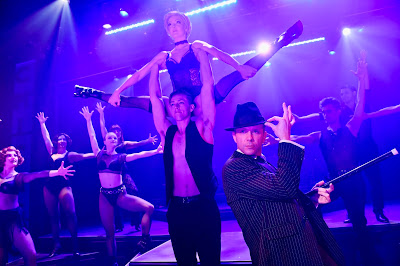Verdi's Il Trovatore
February 15, 2020
 |
| Eugene Brancoveanu as Count di Luna, Mackenzie Gotcher as Count di Luna and Kerriann Otano as Leonora. All photos by David Allen |
The complexity also creates a challenge for the stage director. The action of the narrative is always something that happened twenty years ago, or just offstage, or on a faraway battlefield. Thankfully, we have a few swordfights and lots of smack talk between the combatants, but it's often hard to keep the stage from going still as a painting. I can't say that director Brad Dalton did much to combat this tendency, but he did create some fascinating tableaux with his players (and a few heads on pikes to add ferocity).
 |
| Daryl Freedman as Azucena |
A similar intensity drives the first telling of this tale, "Abbietta zingara," from Ferrando, leader of the Count's guard, played by baritone Nathan Stark. The lead-singer quality of the secondary roles goes on from there, including tenor Mason Gates as Ruiz and mezzo Stephanie Sanchez as Inez. This vocal depth has become an admirable trademark of OSJ's company.
The grandest singing comes from the lovers Leonora and Manrico (the troubadour of the title). Soprano Kerrian Otano and tenor Mackenzie Gotcher share the quality of crafting their lines with the skill of master sculptors. This is especially true of Otano, whose "D'amor sulli'ali rosee" was a seminar in thoughtful phrasing. Her dynamic range is captivating. Gotcher's instrument is a perfect match for Manrico: forceful enough for the call-to-arms of "Di quella pira" but lyric enough for the tenderness of the love aria "Ah si, ben mio coll'essere."
 |
| Eugene Brancoveanu as Count di Luna, Kerriann Otano as Leonora. |
The final killing was, alas, kind of a dud. A throat-slash might best come with the victim faced away from the audience, leaving us to our gory little imaginations.
Through March 1, California Theatre, 345 S. First Street, San Jose. $55-$195, operasj.org, 408/437-4450.
Michael J. Vaughn is the author of 22 novels. His opera novel Gabriella's Voice is available at Amazon.








